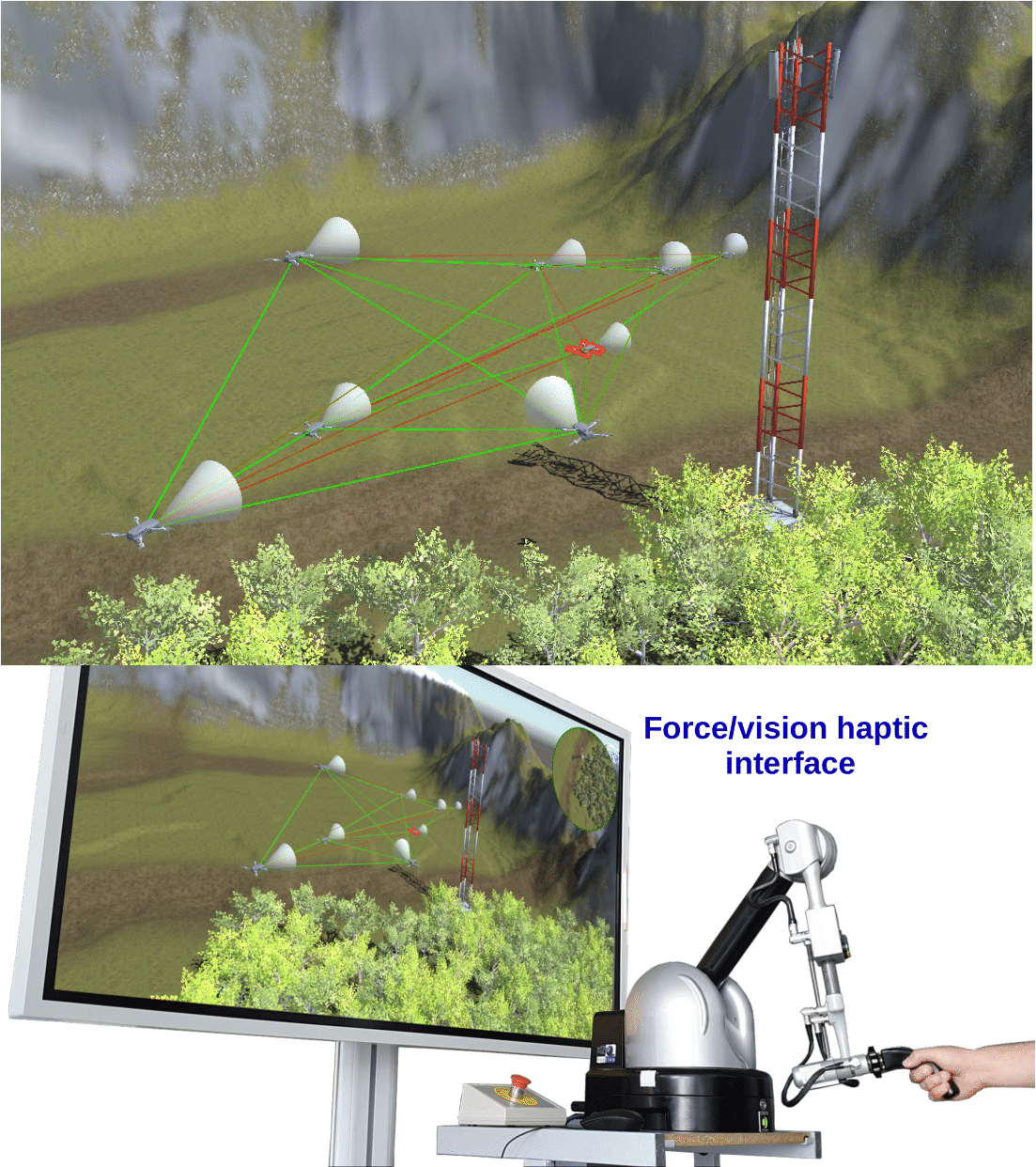Shared autonomy for intuitive human-multi-robot collaboration
Open PhD position

Hired by the Rainbow team IRISA/Inria Rennes, France
Advised by: Claudio Pacchierotti and Esteban Restrepo
Contact: claudio.pacchierotti@irisa.fr – esteban.restrepo@irisa.fr
How to apply: Interested candidates are requested to apply via this form. The position will remain open until a satisfactory candidate is found.
Context
Human-robot collaboration has recently shown promising advances, sparking research on intuitive robot control for collaborative tasks. In particular, by integrating robotic technologies into food and industrial contexts, human-robot collaboration can address challenges of sustainability and efficiency, placing humans at the center of innovative production systems. However, human-multi-robot interaction remains underexplored, especially in scenarios where heterogeneous robot teams collaborate on complex missions with multiple objectives. Indeed, the limitations of each robot can be compensated by combining different robots within the same team, thus collaborating seamlessly to achieve a common goal. For example, transporting a heavy object may be difficult or even impossible for a single robot. In contrast, a multi-robot system can overcome this limitation. This requires intuitive interfaces that allow users to control and coordinate, remotely or within the same workspace, robot teams capable of interacting with each other and their environment.
Envisaged activities
Three major open questions remain regarding human-multi-robot collaboration: (1) Interfaces and flexibility: How can we design interfaces that enable operators to intuitively control heterogeneous robot teams while facilitating dynamic team splitting and merging operations? (2) Safe interactions: How can we ensure safe interactions, adapting robot autonomy to operator capabilities while prioritizing the safety of both humans and robots? (3) Situational awareness: How can we enhance operators’ ability to track team and mission status through relevant and optimized feedback?
This PhD aims to advance the state of the art in three directions: (1) Shared control: Developing techniques that allow humans to give high-level intuitive commands (e.g., linear velocity of a load), which are then transformed into realistic motion plans by the group’s autonomy. Visual and haptic feedback will enrich the understanding of robot actions. (2) Autonomous coordination: Using passivity-based techniques to ensure smooth transitions between human and autonomous control while guaranteeing stable interactions despite uncertainties. (3) Haptic feedback: Developing methods to provide intuitive haptic feedback, helping operators better understand team actions and perform collaborative tasks safely.
Experimental validation: the control methods and algorithms will be validated and tested on human-multi-robot collaborative tasks using the facilities of the Rainbow team, including two indoor and multi-robot arenas, several mobile robots, and haptic interfaces (see picture).
Skills/Requirements
- M.Sc. degree in computer science, robotics, engineering, applied mathematics (or related fields)
- Good knowledge in control theory and robot modeling
- Good experience using Matlab/Simulink
- Previous experience with Python/C++ and ROS2 is appreciated
- Basic knowledge of control and analysis of multi-agent systems is appreciated
- Scientific curiosity, large autonomy and ability to work independently
Conditions
The Ph.D. position is full-time for 3 years (standard duration in France)
The position will be paid according to the French salary regulations for PhD students.
How to apply
Interested candidates are requested to apply via this form.
Supervisor(s): Dr. Esteban Restrepo and Dr. Claudio Pacchierotti
References
-
M. Aggravi, C. Pacchierotti, P. Robuffo Giordano. “Connectivity-maintenance teleoperation of a UAV fleet with wearable haptic feedback.” IEEE Transactions on Automation Science and Engineering, 18(3), 1243-1262, 2020
-
M. Aggravi, A. Alaaeldin Said Elsherif, P. Robuffo Giordano, C. Pacchierotti. “Haptic-Enabled Decentralized Control of a Heterogeneous Human-Robot Team for Search and Rescue in Partially-known Environments.” IEEE Robotics and Automation Letters (also presented at ICRA’21), 6(3):4843-4850, July 2021
-
M. Aggravi, G. Sirignano, P. Robuffo Giordano, C. Pacchierotti. “Decentralized control of a heterogeneous human-robot team for exploration and patrolling.” IEEE Transactions on Automation Science and Engineering, 19(4):3109-3125, September 2022.
-
E. Restrepo, C. Secchi, P. Robuffo Giordano. « Passivity Preserving Energy-Aware Design for Multi-Dimensional Switched Systems: Application to Open Multi-Robot Systems. » 2023 ⟨hal-04330519⟩.